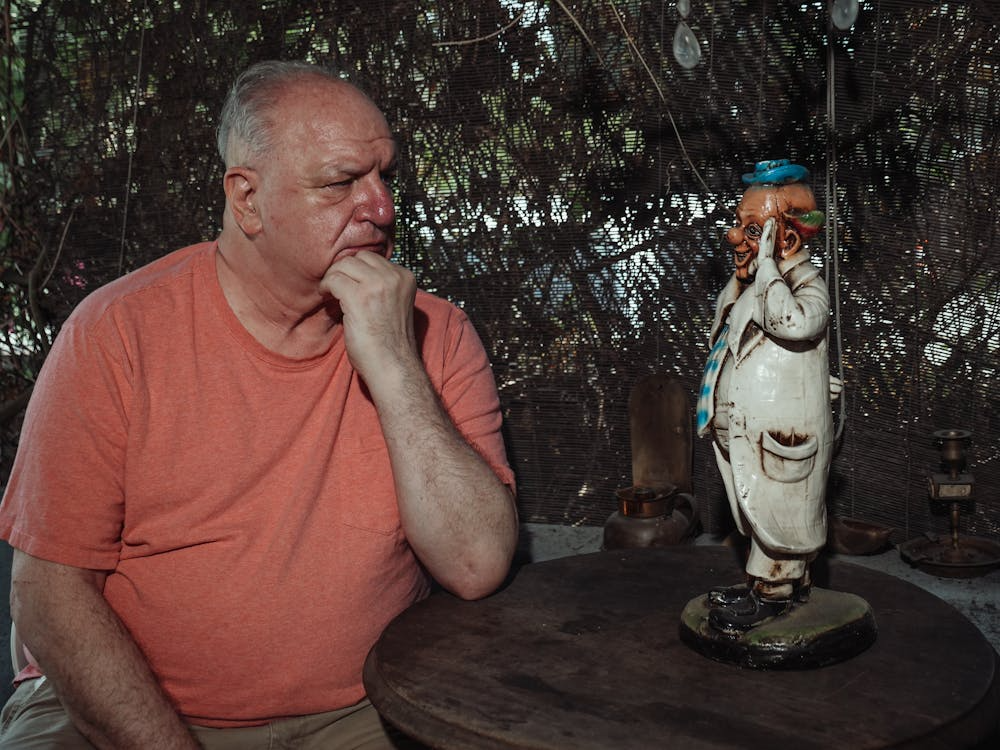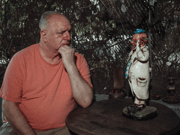
Rebecca Scouller noticed the vegetables in her mother’s freezer, not the fridge, and something immediately felt wrong.
A small mix-up with sugar and salt in baking only added to her unease.
She had no idea these tiny signs would mark the start of a long, challenging journey through a broken healthcare system.
The long wait for a dementia diagnosis
For many Australian families, the path to a dementia diagnosis is long and uncertain.
A study from the University of Canberra’s Centre for Ageing Research and Translation found people waited an average of three years to be diagnosed with Alzheimer’s disease, with some forms of dementia stretching delays even further.
'In some of these conditions, it's five years of uncertainty, five years of not knowing what's happening, [or] what's the cause of these behavioural changes,' said lead researcher Dr Ananthan Ambikairajah.
For Rebecca, the first signs were subtle but telling—confusion with familiar tasks, vegetables misplaced, and small errors in the kitchen.
System cracks revealed
By late 2017, she and her mother Charlotte finally secured a diagnosis, but Rebecca immediately saw the cracks in the system.
'I feel like the whole sector is really broken. You've got the delay of getting diagnosed, the delay of the home care package—so you've got all of these services kicking in after you need them, not when you need them.'
Dr Ambikairajah highlighted the serious consequences of delayed diagnosis.
Patients miss access to services, treatments, and opportunities to live independently for longer.
Up to 50 per cent of risk may be reduced through healthy ageing habits—managing diabetes, blood pressure, and heart health, exercising regularly, and engaging in intellectual and social activities—but these are most effective when started early.
Understanding dementia and early signs
Dementia is not a single disease but an umbrella term for conditions including Alzheimer’s disease, frontotemporal dementia, Lewy Body dementia, and vascular dementia.
Each type can present differently, and not all symptoms match the classic memory loss and confusion.
In the study, early signs included memory problems, personality changes, attention difficulties, and impaired language.
Dr Ambikairajah noted that awareness among healthcare professionals varies.
'When I work with people who live with dementia, they often say that their GP can shape their experience—they can refer them very quickly or may not be aware of different types of dementia.'
Men with behavioural variant frontotemporal dementia experienced an additional two-year delay compared with women, partly because this form affects behaviour rather than memory.
Early warning signs that shouldn't be ignored
Fresh food stored in inappropriate places (freezer instead of fridge)
Confusion with familiar tasks (mixing up ingredients while cooking)
Changes in personality or behaviour
Difficulty with complex tasks like managing finances or using technology
Problems with language or finding the right words
Difficulty planning ahead or making decisions
Loss of initiative or withdrawal from social activities
Family awareness and advocacy
For families, persistence and awareness were key.
About half of patients in the study did not recognise their own symptoms but were encouraged by loved ones to see a doctor.
Rebecca admitted she hesitated to have the difficult conversation with her 77-year-old mother.
'I completely appreciate the fear, anxiety, and in some cases pure terror of going to have that diagnosis,' she said.
The benefits of early diagnosis
Early diagnosis brings benefits beyond symptom management.
'It can help people prepare by understanding what their wishes are, what's most important to them and what they want to be able to keep doing.'
There are signs of hope.
Young-onset dementia diagnoses now often occur within 6–12 months of first GP presentation, a major improvement from past Australian estimates of 3.5 to 5 years.
The University of Canberra’s SPICE program supports people with dementia and their care partners through a 12-week course offering rehabilitation, education, and personalised strategies.
Steps to advocate for timely diagnosis
- Document concerning behaviours and changes over time
- Don't accept 'it's just aging' as an explanation for significant changes
- Ask your GP specifically about dementia assessment if you have concerns
- Request referral to a geriatrician or memory clinic if symptoms persist
- Bring a family member or friend to appointments for support and advocacy
- Seek a second opinion if you feel concerns aren't being taken seriously
Rebecca’s observation that 'the whole sector is really broken' reflects widespread systemic challenges, including long waits for geriatricians and aged care beds.
'It's almost as difficult as it can be to try to navigate that system, and if you don't have a carer lobbying really hard, you can be left behind, and I worry about those people.'
Stigma around dementia compounds these issues.
'It's now the largest killer of Australians, it's not going away. There is better information now about brain health and how we can prevent it. So, if we're not talking about it, we're not going to reduce the rates of dementia going forward.'
Did you know?
Dementia is Australia’s leading killer Dementia has overtaken heart disease as Australia's leading cause of death, yet many people still view it as an inevitable part of ageing rather than a medical condition that can benefit from early intervention and treatment.
Support and hope
Support is available through the National Dementia Helpline (1800 100 500), operating 24 hours a day, seven days a week.
Programs like SPICE and advances in early diagnosis offer hope for better outcomes and opportunities to slow disease progression.
Rebecca’s story shows that advocacy and persistence can make a difference.
Small signs—vegetables in the freezer, sugar swapped for salt—should be treated seriously, not dismissed.
As Australia faces an ageing population and rising dementia rates, timely diagnosis is a matter of dignity, quality of life, and giving families precious time to prepare.
What This Means For You
Families often face years of waiting for a dementia diagnosis, which can create both emotional stress and practical challenges that ripple through daily life. Early signs of dementia frequently appear as minor behavioural or cognitive changes, such as forgetfulness or subtle confusion, which can easily be mistaken for normal ageing.
Research also shows that gender differences exist in diagnosis timing, with men sometimes experiencing longer delays for certain types of dementia, making awareness even more crucial. Programs like SPICE, combined with active family advocacy, have been shown to improve post-diagnosis support and outcomes, giving patients and carers the tools they need to manage the condition effectively. For the audience, recognising these early warning signs and acting promptly can make a meaningful difference—not just in delaying symptoms, but in preserving independence, maintaining quality of life, and providing families with the guidance and support they need to navigate this challenging journey.
If you found the early signs in Rebecca Scouller’s story concerning, there’s another article that dives deeper into subtle behavioural changes that could signal dementia.
This piece highlights everyday habits and unexpected warning signs that often go unnoticed until they become more serious.
It’s a practical follow-up for anyone looking to better recognise early symptoms and take action before it’s too late.
Read more: 5 Shocking Signs You Might Be Ignoring Early Dementia - And It's Not What You Think!
Some dementia patients wait five years for a diagnosis, new research shows | YourLifeChoices — A study from the University of Canberra’s Centre for Ageing Research and Translation found people waited an average of three years for an Alzheimer’s diagnosis.
[URL='https://www.yourlifechoices.c...ears-for-a-diagnosis-new-research-shows/[/URL]
Some dementia patients wait five years for a diagnosis, new research shows | YourLifeChoices — Researchers noted that some forms of dementia involve up to five years of uncertainty due to delayed recognition of behavioural changes.
[URL='https://www.yourlifechoices.c...ears-for-a-diagnosis-new-research-shows/[/URL]
Diagnosis of dementia in under 65-year-olds often faces frustrating delay—The University of Auckland — A partner in a New Zealand study described the emotional impact of delayed dementia diagnosis as feeling that life is on hold with no clear future.
[URL='https://www.auckland.ac.nz/en...is-under-65-year-olds-often-delayed.html[/URL]
Some dementia patients wait five years for a diagnosis, new research shows | YourLifeChoices — Dr Ambikairajah highlighted that failure to diagnose early and accurately can have serious consequences for patients.
[URL='https://www.yourlifechoices.c...ears-for-a-diagnosis-new-research-shows/[/URL]
Earlier diagnosis and treatment of dementia may help delay progression of the disease: researchers | Folio — Up to 50 per cent of dementia risk may be mitigated through healthy ageing habits like managing chronic conditions, exercising, and engaging socially and intellectually.
[URL='https://www.ualberta.ca/en/fo...t-of-dementia-may-delay-progression.html[/URL]
Diagnosis of dementia in under 65-year-olds often faces frustrating delay—The University of Auckland — Dementia is better understood as an umbrella term describing a range of symptoms caused by different diseases.
[URL='https://www.auckland.ac.nz/en...is-under-65-year-olds-often-delayed.html[/URL]
Diagnosis of dementia in under 65-year-olds often faces frustrating delay—The University of Auckland — Different types of dementia can present symptoms that diverge from classic memory loss and confusion.
[URL='https://www.auckland.ac.nz/en...is-under-65-year-olds-often-delayed.html[/URL]
Some dementia patients wait five years for a diagnosis, new research shows | YourLifeChoices — GPs can significantly influence a patient’s dementia experience through timely referral, but awareness of dementia types varies.
[URL='https://www.yourlifechoices.c...ears-for-a-diagnosis-new-research-shows/[/URL]
Some dementia patients wait five years for a diagnosis, new research shows | YourLifeChoices — Research revealed men with behavioural variant frontotemporal dementia experience an additional two-year delay compared with women.
[URL='https://www.yourlifechoices.c...ears-for-a-diagnosis-new-research-shows/[/URL]
Diagnosis of dementia in under 65-year-olds often faces frustrating delay—The University of Auckland — About half of patients were unaware of their own symptoms but were prompted to seek help by loved ones.
[URL='https://www.auckland.ac.nz/en...is-under-65-year-olds-often-delayed.html[/URL]
Earlier diagnosis and treatment of dementia may help delay progression of the disease: researchers | Folio — Early diagnosis helps people understand their wishes and priorities, offering benefits beyond delaying symptoms.
[URL='https://www.ualberta.ca/en/fo...t-of-dementia-may-delay-progression.html[/URL]
The road to young‐onset dementia diagnosis: Findings from the Joint Solutions Project—Tjokrowijoto—2025—Alzheimer's & Dementia — Most young-onset dementia patients now receive a diagnosis within 6–12 months of first GP presentation.
[URL='https://alz-journals.onlineli...ary.wiley.com/doi/full/10.1002/alz.70538[/URL]
Keeping the SPICE of life for people with dementia—University of Canberra — The SPICE program offers personalised interventions in cognition, care, and engagement for people with dementia.
[URL='https://www.canberra.edu.au/r...ct/impact-stories/dementia-spice-program[/URL]
Some dementia patients wait five years for a diagnosis, new research shows | YourLifeChoices — Delays in accessing diagnosis and home care packages highlight systemic challenges in aged care services.
[URL='https://www.yourlifechoices.c...ears-for-a-diagnosis-new-research-shows/[/URL]
Alzheimers Research Australia — Research focuses on earlier Alzheimer’s diagnosis to enable timely actions that may slow disease progression.
[URL='https://alzheimersresearch.org.au/[/URL']https://alzheimersresearch.org.au/[/URL]
Have you or a loved one experienced delays in getting a dementia diagnosis? What strategies helped you navigate the system?







